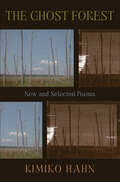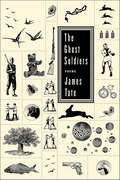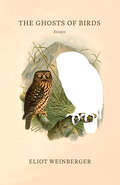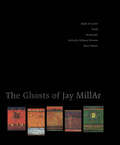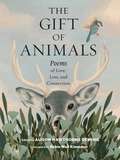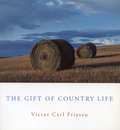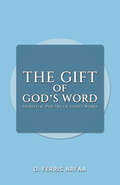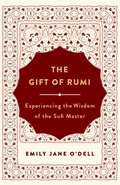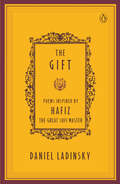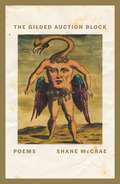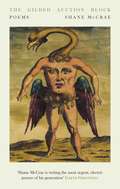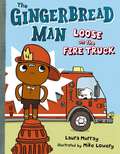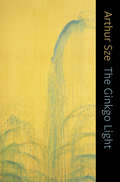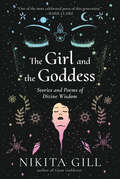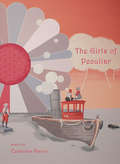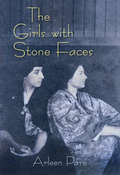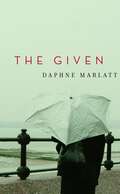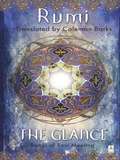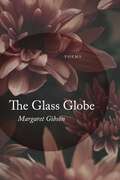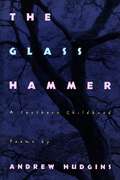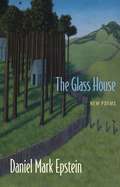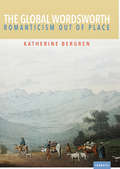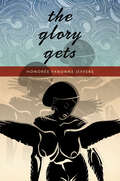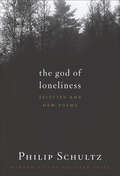- Table View
- List View
The Ghost Child Ballet: A Poetry Collection
by Misty BurkeIn the tradition of the confessional poets, Misty Burke's newest poetry collection is a heartfelt and emotional look at raising an autistic child. It takes the reader from the difficulties of a premature delivery to parenting an adult with autism. The Ghost Child Ballet is written in a conversational, narrative tone that uses everyday events to explore some of the bigger issues within the special needs community.
The Ghost Forest: New and Selected Poems
by Kimiko Hahn“Borrowing from [such writers as] Elizabeth Bishop and Chimako Tada, featuring ghosts and geoglyphs, writing in form and free verse, Kimiko Hahn’s broad and eclectic approach reveals a mind as vast as the terrains it traverses.”—Nicole Sealey, Poetry magazine Opening with forty-three new formally inventive poems and leading the reader back in time through selections from her ten previous volumes, The Ghost Forest offers a contemplative and haunting narrative of a writer’s artistic journey through craft and form while illuminating her personal history. Exploring the mysteries of science, nature, and the experiences of contemporary womanhood, Hahn both reinvents classic Japanese forms and experiments with traditional Western ones. Braided into the poems and narrative thread, a series of photos transforms the new-and-selected into a hybrid autobiography. This arresting collection derives new beauty from long-gone remnants. A Riotous Disorder She mistakes one word for another— Something her brain naturally concocts. Her unruly gray matter and her heart Mistake one word for an other— Razor for river, cistern for sister. Even cock for clock. She mistakes one word for a mother— A safe her brain naturally unlocks.—
The Ghost Soldiers: Poems
by James TatePulitzer Prize–winning poet James Tate returns with his fifteenth book of poetry, an exciting new collection that offers nearly one hundred fresh and thought-provoking pieces that embody Tate's trademark style and voice: his accessibility, his dark humor, and his exquisite sense of the absurd. Tate's work is stark—he writes in clear, everyday language—yet his seemingly simple and macabre stories are layered with broad and trenchant meaning. His characters are often lost or confused, his settings bizarre, his scenarios brilliantly surreal. Opaque, inscrutable people float through a dreamlike world where nothing is as it seems. The Ghost Soldiers offers resounding proof, once again, that Tate stands alone in American poetry.
The Ghosts of Birds
by Eliot WeinbergerA new collection from "one of the world's great essayists" (The New York Times) The Ghosts of Birds offers thirty-five essays by Eliot Weinberger: the first section of the book continues his linked serial-essay, An Elemental Thing, which pulls the reader into "a vortex for the entire universe" (Boston Review). Here, Weinberger chronicles a nineteenth-century journey down the Colorado River, records the dreams of people named Chang, and shares other factually verifiable discoveries that seem too fabulous to possibly be true. The second section collects Weinberger's essays on a wide range of subjects--some of which have been published in Harper's, New York Review of Books, and London Review of Books--including his notorious review of George W. Bush's memoir Decision Points and writings about Mongolian art and poetry, different versions of the Buddha, American Indophilia ("There is a line, however jagged, from pseudo-Hinduism to Malcolm X"), Béla Balázs, Herbert Read, and Charles Reznikoff. This collection proves once again that Weinberger is "one of the bravest and sharpest minds in the United States" (Javier Marías).
The Ghosts of Jay Millar
by Jay MillarJay used to have an ego, but had it surgically removed. Get bur'd by Alex Cayce; Perfectly Ordinary Dreams by James Llar; Short Ghosts by John Elliott; heartrants by H. Azel; and Book of Leaves by Conwenna Stokes: five books written in five radically different styles.
The Gift of Animals: Poems of Love, Loss, and Connection
by Alison Hawthorne DemingThis unique collection of poems from diverse contemporary voices offers a range of perspectives on humans' complex relationship with animals, celebrating and bearing witness to the lives of animals both wild and domestic. Animals have long been a source of inspiration, sustenance, and companionship, and poems about and for animals are among the oldest traditions across human cultures. This collection of contemporary poems adds to this ancient lineage, celebrating animals for their beauty and intelligence; empathizing over their suffering; and hoping for their future, which is entwined with our own. The presence of an animal is a gift. The loss of an animal is a grief. To share such feelings through poetry is to create a community of caring for the creatures that accompany us on Earth. The Gift of Animals includes poems by some of today's most beloved poets, including Ellen Bass, Lucille Clifton, Michael Collier, Toi Derricotte, Rita Dove, Camille Dungy, Mark Doty, Nick Flynn, Jorie Graham, Joy Harjo, Terrance Hayes, Arthur Sze, Yusef Komunyakaa, Ada Limón, Aimee Nezhukumatathil, Craig Santos Perez, Paisley Rekdal, and more.
The Gift of Country Life
by Victor Carl FriesenMemories of farming in the 1940s conjure up images of horse-drawn farm machinery, grain stooks in fields, hay meadows, free-range chickens and cords of wood strategically placed for fuelling the kitchen range – all before farming became the highly technical, big-time operation it is now. Author Victor Carl Friesen was born and raised on a quarter section farm in Saskatchewan and still owns the "home place." It is there he still goes to renew his inner being. His poems, grouped into seasonal activities or observations, celebrate the rural world. Written in traditional blank verse, his poetry includes activities of yesteryear, his personal connections to rural life and his reverence for nature. Nature, as Henry David Thoreau said, is "one and continuous." Victor Carl Friesen lives and writes in Rosthern, Saskatchewan, but photographs nature anywhere. The first recipient of the Alberta Book Award, he is the author of five books including The Year Is a Circle.
The Gift of God’s Word: Spiritual Poetry of God’s Word
by D. Ferris Arfaa&“Oh, Lord, tell me!How was His body when He ascended to Your heavenly center?Was He brightly magnificent in holiness prepared to heaven enter?Was He clothed in purity and devotion, though stripped by our sin?Was He wearing goodness and sanctity as He entered therein?&”From the poem &“His Body,&” the eminently spiritual poetic verse from the pen of D. Ferris Arfaa contains the meaning and effect for which so many people are searching today.Guided by the intent of divine inspiration, the author&’s collection of verse, The Gift of God&’s Word, is just that: a magnificent gift!Realized from scripture, this book contains poems that reflect on the teachings and life of Jesus Christ as revealed in the gospels of Luke and Matthew.They are invented to uplift, educate, and illuminate God&’s love and the power of faith, while establishing and understanding the way toward salvation. And that&’s the best gift of all!
The Gift of Rumi: Experiencing the Wisdom of the Sufi Master
by Emily Jane O'DellAn authentic exploration of the real RumiAs one of the world's most loved poets, Rumi's poems are celebrated for their message of love and their beauty, but too often they are stripped of their mystical and spiritual meanings. The Gift of Rumi offers a new reading of Rumi, contextualizing his work against the broader backdrop of Islamic mysticism and adding a richness and authenticity that is lacking in many Westernized conceptions of his work. Author Emily Jane O'Dell has studied Sufism both academically, in her work and research at Harvard, Columbia, and the American University of Beirut, and in practice, learning from a Mevlevi master and his whirling dervishes in Istanbul. She weaves this expertise throughout The Gift of Rumi, sharing a new vision of Rumi’s classic work.At the heart of Rumi’s mystical poetry is the “religion of love” which transcends all religions. Through his majestic verses of ecstasy and longing, Rumi invites us into the religion of the heart and guides us to our own loving inner essence. The Gift of Rumi gives us a key to experiencing this profound and powerful invitation, allowing readers to meet the master in a new way.
The Gift: Poems Inspired by Hafiz, the Great Sufi Master (Compass)
by Daniel LadinskyDaniel Ladinsky&’s 250 unforgettable lyrical poems are inspired by the cherished verse of Hafiz, one of the greatest Sufi poets of all time. More than any other Persian poet, Hafiz expanded the mystical, healing dimensions of poetry. Because his poems were often ecstatic love songs from God to his beloved world, many have called Hafiz the &“Invisible Tongue.&” Daniel Ladinsky&’s poems are not translations in a literal sense. Rather than capture the form of a particular classical work, Ladinsky crafts poems that release the spirit of Hafiz based on his study of stories and poems attributed to the revered Persian writer. The Gift imparts the wonderful qualities of this master Sufi poet and spiritual teacher: encouragement, an audacious love that touches lives, profound knowledge, generosity, and a sweet, playful genius unparalleled in world literature.
The Gilded Auction Block: Poems
by Shane McCraeAn incisive new collection of poetry on political and contemporary themesI’m made of murderers I’m madeOf nobodies and immigrants and the poor and a whole / Family the mother’sliver and her lungsIn The Gilded Auction Block, the acclaimed poet Shane McCrae considers the present moment in America on its own terms as well as for what it says about the American project and Americans themselves. In the book’s four sections, McCrae alternately responds directly to Donald Trump and contextualizes him historically and personally, exploding the illusions of freedom of both black and white Americans. A moving, incisive, and frightening exploration of both the legacy and the current state of white supremacy in this country, The Gilded Auction Block is a book about the present that reaches into the past and stretches toward the future.
The Gilded Auction Block: Poems
by Shane McCrae'Beautifully up-to-date, old-fashioned work, where the dignity of English meters meets, as in a mosh pit, the vitality - and often the brutality - of American speech' Dan Chiasson, New Yorker'Shane McCrae is one of our best, a great poet who mines the rhythms and vernacular of America, excavating the most exquisite of poems. His work is risky, not risqué; intelligent, not clever; deep, not jocular surface play. He is sui generis' Rabih AlameddineI'm made of murderers I'm madeOf nobodies and immigrants and the poorand a whole / Family the mother'sliver and her lungsIn The Gilded Auction Block, the acclaimed poet Shane McCrae considers the present moment in America on its own terms as well as for what it says about the American project and Americans themselves. In the book's four sections, McCrae alternately responds directly to Donald Trump and contextualizes him historically and personally, exploding the illusions of freedom of both black and white Americans. A moving, incisive, and frightening exploration of both the legacy and the current state of white supremacy, The Gilded Auction Block is a book about the present that reaches into the past and stretches toward the future.
The Gingerbread Man Loose on the Fire Truck (The Gingerbread Man Is Loose #2)
by Laura MurrayA visit to a fire house is always fun, but it's even more exciting when the Gingerbread Man comes along!Guess who gets to go along on a field trip to the firehouse? The Gingerbread Man! But when he falls out of his classmate's pocket, Spot the Dalmatian comes sniffing around. Luckily, this Gingerbread Man is one smart cookie, and he races into the fire truck, up the pole, and all through the station, staying one step ahead of the hungry dog the whole time. Then an emergency call comes in and the Gingerbread Man knows just what to do:&“I&’ll ride to the rescue, as fast as I can.I want to help, too! I&’m the Gingerbread Man!&”With snappy rhymes and fresh illustrations, the Gingerbread Man makes a sweet return in his second school adventure.
The Ginkgo Light
by Arthur Sze"Classically elegant."--The New York Times Book ReviewSze's free verse emphasizes at once how difficult, and how necessary, it is for us to imagine our world as a system whose ecologies and societies require us to care for all their interdependent parts." --Publishers Weekly"Sze's list-laden sequences capture the world's manifold facts one by one, then through discursive commentary exact from them a sense not only of aesthetic order but of universal cause and effect."--Boston Review"Sze...here captures the energy of life in overshadowed daily events....His poems mine everything from geography, history, and biology to philosophy and nature, interweaving them to create a complex and luminous poetic texture....His poetry is an experience of awakening and pleasure that all serious students of contemporary poetry should have." --Library Journal"Whether incorporating nature, philosophy, history, or science, Sze's poems are expansive. They unfold like the time-slowed cinematic recording of a flower's blooming...Sze has a refreshingly original sensibility and style, and he approaches writing like a collagist by joining disparate elements into a cohesive whole." --BooklistA temple near the hypocenter of the atomic blast at Hiroshima was disintegrated, but its ginkgo tree survived to bud and bloom. Arthur Sze extends this metaphor of survival and perseverance to transform the world's factual darkness into precarious splendor. "Each hour teems," Sze writes, as he ingeniously integrates the world's miraculous and mundane--a woodpecker drilling a utility pole or a 1300-year-old lotus seed--into a moving, visionary journey.Mayans charted Venus's motion across the sky,poured chocolate into jars and interred themwith the dead. A woman dips three bowls intohair's fur glaze, places them in a kiln, anticipatesremoving them, red-hot, to a shelf to cool.When samba melodies have dissipated into air,when lights wrapped around a willow have vanished,what pattern of shifting lines leads to Duration?Arthur Sze, one of America's leading poets, is the author of nine books of poetry and translation. He is professor emeritus of creative writing at the Institute of American Indian Arts and just completed a term as Poet Laureate of Santa Fe, New Mexico.
The Girl and the Goddess: Stories and Poems of Divine Wisdom
by Nikita GillBestselling poet, writer, and Instagram sensation Nikita Gill returns with an innovative novel in verse, exploring Hindu mythology and legend.Let her be a little less human, a little more divineGive her heart armor so it doesn't break as easily as mineMeet Paro. A girl with a strong will, a full heart, and much to learn. Born into a family reeling from the ruptures of Partition in India, we follow her as she crosses the precarious lines between childhood, teenage discovery, and realizing her adult self. In the process, Paro must confront fear, desire and the darkest parts of herself in the search for meaning and, ultimately, empowerment.Nikita Gill's vivid poetry and beautiful illustrations have captured hearts and imaginations--but in The Girl and the Goddess, she offers us her most personal and deeply felt writing to date: an intimate coming-of-age story told in linked poems that offers a look into the Hindu mythology and rich cultural influences that helped her become the woman she is today.
The Girls of Peculiar
by Catherine PierceIn Catherine Pierce's most peculiar second collection, we enter a world of longing and destruction, of death and rebirth, and of wonderfully odd girls--girls who read too much, who drink too much or not enough, who craft necklaces from earwigs and wring nostalgia from Spiro Agnew. These are poems of questions and restlessness, but also of answers of a sort. As Beth Ann Fennelly writes, "[t]he big themes here--self identity, desire, escape--are illuminated with clarity, scored musically, and enlivened with wit. The Girls of Peculiar is a fabulous book."
The Girls with Stone Faces
by Arleen ParéA long poem memorializing the art and lives of sculptors Frances Loring and Florence Wyle. Arleen Paré, in her first book-length poem after her Governor General Literary Award–winning Lake of Two Mountains, turns her cool, benevolent eye to the shared lives of Florence Wyle and Frances Loring, two of Canada’s greatest artists, whose sculptures she comes face to face with at the National Gallery of Canada. In the guise of a curator, Paré takes us on a moving, carefully structured tour through the rooms where their work is displayed, the Gallery’s walls falling away to travel in time to Chicago (where they met at art school and fell in love in the 1910s), New York, and Toronto (where they lived and worked for the next six decades). Along the way, Paré looks at fashions in art, the politics of gender, and the love that longtime proximity calls forth in us. The Girls with Stone Faces is one of the finest collections of poetry about the lives of artists—and most importantly their work—to appear in Canada in many years. Although Wyle and Loring were well known during their lifetimes, they have dropped out of common memory. Paré’s collection is art loving art, woman loving women, words loving shape, poetry loving stone, the curve of jaw, the trajectory of days.
The Given
by Daphne MarlattWinner of the Dorothy Livesay Poery PrizeFinalist for the Pat Lowther Memorial Award“You remember — what is it you remember? / the feel of home, that moment of coming into your body. . . ”So begins Daphne Marlatt’s haunting and multi-layered long poem, which reads with all the urgency and depth of a novel. Set in present-day and 1950s Vancouver, The Given begins with the news of a mother’s death, then opens up to become an intricate tapestry of lives, as Marlatt deftly interweaves the past with the present, replicating the arc of memory itself, while questing for — and questioning — the meaning of home and identity. Circling around the narrator’s mother — theatrical, troubled, imprisoned in the small existence of a 1950s housewife, and a persistent presence in the lives of others — The Given is a ceremony performed for her, and for all “those who have left, who go on burning in us.” In luminous, deeply resonant fragments, Marlatt resoundingly answers the drive to live with deep attention in a now that is, for all of us, “tangled in the past.”
The Glance
by Coleman Barks Nevit Ergin Jalaloddin RumiIn 1244, the brilliant poet Rumi and the wandering dervish Shams of Tabriz met and immediately fell into a deep spiritual connection. The Glance taps a major, yet little explored theme in Rumi's poetry-the mystical experience that occurs in the meeting of the eyes of the lover and the beloved, parent and child, friend and soul mate. Coleman Barks's new translations of these powerful and complex poems capture Rumi's range from the ethereal to the everyday. They reveal the unique place of human desire, love, and ecstasy, where there exists not just the union of two souls, but the crux of the universe. Here is a new kind of love lyric for our time-one of longing, connection, and wholeness.
The Glass Globe: Poems
by Margaret GibsonWith The Glass Globe, celebrated poet Margaret Gibson completes a trilogy distinguished by its meditative focus on the author’s experience of her late husband’s Alzheimer’s disease. In this new collection, she blends elegies of personal bereavement with elegies for the earth during the ongoing global crisis wrought by climate change. Gibson’s poems personalize the vastness of climate catastrophe while simultaneously enlarging personal grief beyond the limits of self-absorption. A work of great compassion and vision, The Glass Globe is a necessary, heartbreaking book from one of our most compelling poets.
The Glass Hammer
by Andrew HudginsThe Glass Hammer, the fourth book of poems by the celebrated author of After the Lost War, is a southern narrative poem. It tells the story of a boy brought up in a military family in Texas and Alabama, and it is as rich in emotion and experience as any novel, as family life itself. In a sequence of sixty-five short lyrics, the narrator moves from the anecdotal circumstances of his infancy to the rebellions of his youth and adolescence, from the tragedy of his mother's death to the acceptance of his father's disciplinary love. This sequence of poems is human, solid, passionate, rueful, and eminently readable. It is as transparent as a mountain brook and moves as fast. It is as painful and powerful and surprising as first love and first loss.
The Glass House: New Poems
by Daniel Mark EpsteinIncludes: Vision At Dawn, The Pure Gift, The Jealous Man, Curses, and more.
The Global Wordsworth: Romanticism Out of Place (Transits: Literature, Thought & Culture 1650-1850)
by Katherine BergrenThe Global Wordsworth charts the travels of William Wordsworth’s poetry around the English-speaking world. But, as Katherine Bergren shows, Wordsworth’s afterlives reveal more than his influence on other writers; his appearances in novels and essays from the antebellum U.S. to post-Apartheid South Africa change how we understand a poet we think we know. Bergren analyzes writers like Jamaica Kincaid, J. M. Coetzee, and Lydia Maria Child who plant Wordsworth in their own writing and bring him to life in places and times far from his own—and then record what happens. By working beyond narratives of British influence, Bergren highlights a more complex dynamic of international response, in which later writers engage Wordsworth in conversations about slavery and gardening, education and daffodils, landscapes and national belonging. His global reception—critical, appreciative, and ambivalent—inspires us to see that Wordsworth was concerned not just with local, English landscapes and people, but also with their changing place in a rapidly globalizing world. This study demonstrates that Wordsworth is not tangential but rather crucial to our understanding of Global Romanticism. Published by Bucknell University Press. Distributed worldwide by Rutgers University Press.
The Glory Gets (Wesleyan Poetry Series)
by Honorée Fanonne JeffersIn her three previous, award-winning collections of blues poetry, Honorée Fanonne Jeffers has explored themes of African American history, Southern culture, and intergenerational trauma. Now, in her fourth and most accomplished collection, Jeffers turns to the task of seeking and reconciling the blues and its three movements--identification, exploration, and resolution--with wisdom. Poems in The Glory Gets ask, "What happens on the road to wisdom? What now in this bewildering place?" Using the metaphor of "gets"--the concessional returns of living--Jeffers travels this fraught yet exhilarating journey, employing unexpected improvisations while navigating womanhood. The spirit and spirituality of her muse, the late poet Lucille Clifton, guide the poet through the treacherous territories other women have encountered and survived yet kept secret from their daughters. An online reader's companion will be available.
The God of Loneliness: Selected and New Poems
by Philip SchultzPhilip Schultz, winner of the 2008 Pulitzer Prize for poetry, has been celebrated for his singular vision of the American immigrant experience and Jewish identity, his alternately fierce and tender portrayal of family life, and his rich and riotous evocation of city streets. His poems have found enthusiastic audiences among readers of Garrison Keillor’s Writer’s Almanac, Slate, The New Yorker, and other publications. His willingness to face down the demons of failure and loss, in his previous book particularly, make him a poet for our times, a poet who can write “If I have to believe in something / I believe in despair.” Yet he remains oddly undaunted: “sometimes, late at night / we, my happiness and I, reminisce / lifelong antagonists / enjoying each other’s company.”The God of Loneliness, a major collection of Schultz’s work, includes poems from his five books (Like Wings, Deep Within the Ravine, The Holy Worm of Praise, Living in the Past, Failure) and fourteen new poems. It is a volume to cherish, from “one of the least affected of American poets, and one of the fiercest” (Tony Hoagland), and it will be an essential addition to the history of American poetry.

